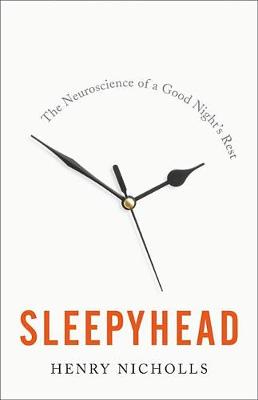
"Whether it's a bout of bad jet lag or a stress-induced all-nighter, we've all suffered from nights that left us feeling less than well-rested. But for some people, getting a bad night's sleep isn't just an inconvenience: it's a nightmare. In Sleepyhead, science writer Henry Nicholls uses his own experience with chronic narcolepsy as a gateway to better understanding the cryptic, curious, and relatively uncharted world of sleep disorders. We meet insomniacs who can't get any sleep, narcoleptics who can't control when they sleep, and sleep apnea victims who nearly suffocate in their sleep. We learn the underlying difference between morning larks and night owls; why our sleeping habits shift as we grow older; and the evolutionary significance of REM sleep and dreaming. Charming, eye-opening, and deeply humanizing, Sleepyhead will help us all uncover the secrets of a good night's sleep." --
As one or two of my BL friends might know, I have narcolepsy; I was diagnosed almost 5 years ago, but it's likely I've had it most of my life - because I don't suffer from cataplexy (the uncontrollable bouts of muscle paralysis), we all just thought I was lazy.
That sounds like a jest, but it isn't; so little is known about narcolepsy, cataplexy and all the other sleep disorders that science is just beginning to focus on, that society tends to equate someone being tired during the day with being lazy, hungover or a new parent. I don't overindulge and I'm not a parent, so ... lazy. Except it turns out I'm not, something my sleep doctor has been trying to tell me for 4.5 years, but I didn't really believe until I read this book.
Now I know, really know, that I have been the unfortunate victim of an auto-immune response run amok. My immune system killed off the areas of my brain responsible for making hypocretin, probably because the cells looked too much like strep, or flu. As Nicholls explains, hypocretin does a LOT for us, not the least of which includes making sure the body is either asleep or awake (not both), modulates dopamine and serotonin, and controls the trigger for REM. The upside for narcoleptics: we're a little less likely to suffer addictions; the downside: it's a moot point, since we don't need drugs to hallucinate.
This was the thing I wanted most from this book and I got it - I have a much greater understanding of what's going on at a chemical level in my brain. I am also left with no doubt as to whether or not I really have narcolepsy. This is a spectrum disorder, and I am solidly on the spectrum.
But I learned so much more, because this book isn't just about Narcolepsy; the author spends a solid amount of time and focus on other sleep disorders too; those that are intimately familiar to a large number of people, like insomnia, and those that are just now beginning to be formally identified, like Restless Leg Syndrome and the rare but terrifying Fatal Familial Insomnia; a prion disease that stops sleep completely and is always fatal.
This isn't a self help book, or a book of strategies for dealing with sleep disorders, but the author does discuss a few different avenues science is taking towards sleep management, and these apply to pretty much anyone searching for healthy sleep. I could wish for more coverage of current medical treatments, but honestly, there really aren't that many, though research tantalisingly looks to be on the right track.
If you're interested in sleep disorders in general, and the science of sleep, this is a good introduction to both, though the author's battle with narcolepsy is what gives the book its focus. He includes a very thorough notes section with complete citations, and a section of recommended further reading that includes several titles aimed at the broader topic of sleep's importance to everyone's health, as well as a few titles more explicitly aimed at specific sleep disorders. While this is not one I'd generally recommend to everyone, it's definitely informative to anyone suffering from a lack of healthy sleep.
Reading updates
-
Started reading
-
13 May, 2018:
Finished reading
-
13 May, 2018:
Reviewed
